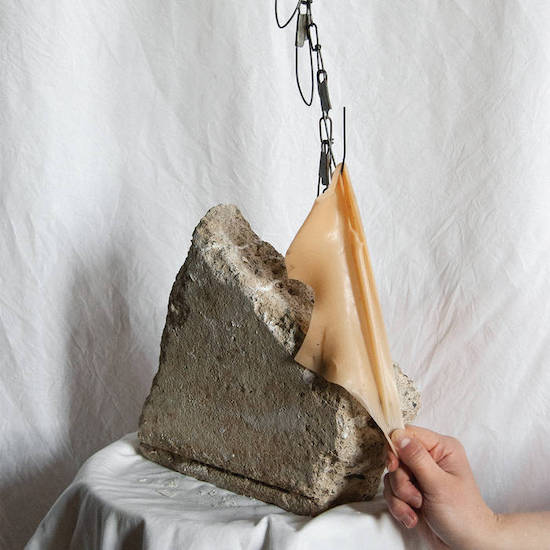As I write this, it’s All Souls’ Day, and I’m not feeling that great, which – obviously – is a bad scene during a pandemic. My symptoms are a nebulous mélange of things that may or may not indicate a COVID-19 infection, and my test results are taking an eternity to process. It’s likely they’ll be in today, but it’s also possible they won’t. Anyway, this is a stressor I could do without, and I’m looking for some calm. Maybe most of us are. There we go, grasping for split-second, out-of-body moments of total serenity that slip by as we flail, sliding unceasingly along thin ice under an ominous sky. (Metaphorically speaking, anyhow.) And maybe the luckiest among us are those that can engage with the world but hold onto and live inside those elusive moments, somehow elongate them until one bleeds into the next, laid out almost forever. I wonder if Drew McDowall is one of these people, though I don’t want to be presumptuous. I am, after all, practicing something akin to divination, basing my current supposition on the smears of aurora borealis stretched immaculately across his latest and best LP, Agalma.
When I wrote most of the notes for this review, I was tap-tap-tapping them out on my phone in a hospital waiting room, queued up to be tested. This would be last Thursday, and my mind was understandably scattered. Considering all the miserably infected strewn about the place – myself included – I thought, "If any of us are COVID negative now, we won’t be when we leave." Looking at those notes today, my anxiousness permeates every sentence fragment. Then, in boldface type: "EMBARRASSMENT OF RICHES?"
Now, technically, an embarrassment of riches is bad, a "too much of a good thing" sort of thing. So, let’s say that Agalma presents us with exactly the right amount of riches made manifest in part by an impossibly stacked deck of collaborators: Caterina Barbieri, Kali Malone, Robert Aiki Aubrey Lowe, Bashar Suleiman, Elvin Brandhi, MSYLMA, and Maralie Armstrong-Rial on a bonus track, with Ben Greenberg in the production booth and Josh Bonati on the master. That’s a who’s who of experimental music. Even if Drew McDowall totally sucked, based on the strength of those collaborators, it’s hard to imagine this record being bad.
But McDowall doesn’t suck – his post-Coil body of work alone is singularly excellent, and the few "non-collaborative" compositions on this record – ‘Agalma I (Folding)’, ‘Agalma VI’, and the bonus track ‘Abandoned Object’ – attest to his excellence flying solo. Still, the bulk of his latest full-length is made up of deliriously fruitful collaborations that sound united in purpose and vision. Agalma is nothing if not cohesive in its lean, slow-burn, low-key psychedelia – which is an achievement in and of itself, given the tendency of records with so many "featured" artists to feel somewhat disjointed, like grab bags. (Honestly, it’s hard to imagine any fans of the guest musicians listed above being less than into this LP. Elvin Brandhi heads take note.)
I’ve already mentioned stretching and smearing and gestured toward temporality in this piece, but its impossible to shake those descriptors while listening to Agalma. This album, buzzing and resonant, draws time thin, pulls it almost transparent like a veil, perhaps disregarding it as a linear concept altogether. Fitting then, that I’m writing about it on All Souls’, and that it came out on Devil’s Night. Folklorically speaking, this is when the membrane between worlds is arguably at its thinnest. Or, should you not believe in "other worlds", just this one with its past and present and future, one could posit that this is when linear time is at its most discombobulated, when the tarpaulin that separates its three primary components has the potential to part ever so slightly. Who knows?
In certain medieval Eastern European traditions, common folk would spend All Hallows’ Eve tramping through the forests, praying and singing to benefit and soothe the souls of their lost kin, who were also meant to be wandering the woods that night. But maybe those souls sang, too, simultaneously, for their ancestors and their descendants – nothing more than moments in time, forward and back, all overlapping? However fantastical that proposition, the works that unspool over the course of Agalma‘s 52 minutes sound like hymns of comfort piercing the membrane, drifting back and forth through that tarpaulin, oddly soothing but rendered equally strange and sometimes unsettling as they overlap, unmoored by time, distorted by their journey. Voices multiply and become nearly indistinguishable from synth tones which, in turn, might become nearly indistinguishable from the human voice or mingle with asynchronous organic elements like Kali Malone’s pipe organ and its evocation of the sacred.
Not that long ago, I had a six-inch cotton swab inserted in my left nostril for ten seconds. Shortly after, another equally long cotton swab was inserted into my right nostril for another ten seconds. It wasn’t so bad. I managed to focus on my breathing, to be both deeply present in and paradoxically removed from that theoretically unpleasant moment. It was almost jarring when the test was over. I thought about ‘Agalma VII (Toyor El Janeh)’, a hypnotic number featuring McDowall, Suleiman, MSYLMA, and Brandhi working together to scrape at the ecstatic, pick at the sublime. A third of the way through, give or take, a loud percussive strum interrupts the proceedings. Thunder from the ominous sky, the boom of cracking ice underfoot. It feels, for a moment, like the ritual profaning of a holy, meditative space. From that point, a serene beauty is pursued alongside a subtly chaotic, parallel weirding of the track. By the end, it feels like a stalemate’s been reached. Or better yet, as if one can’t truly exist without the other. After all, what’s serenity without a little chaos?


